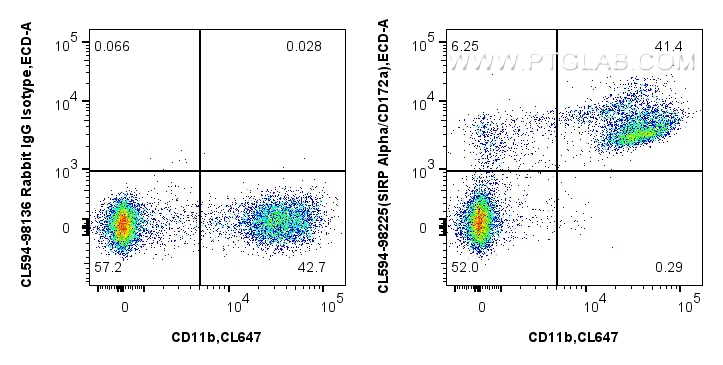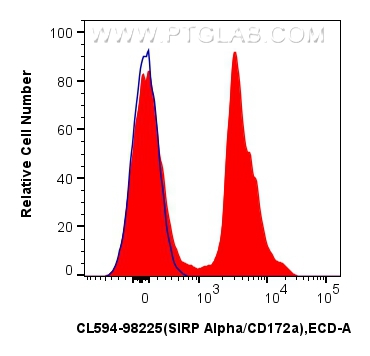验证数据展示
经过测试的应用
| Positive FC detected in | mouse bone marrow cells |
推荐稀释比
| 应用 | 推荐稀释比 |
|---|---|
| Flow Cytometry (FC) | FC : 0.25 ug per 10^6 cells in 100 μl suspension |
| This reagent has been tested for flow cytometric analysis. It is recommended that this reagent should be titrated in each testing system to obtain optimal results. | |
| Sample-dependent, Check data in validation data gallery. | |
产品信息
CL594-98225 targets SIRP Alpha/CD172a in FC applications and shows reactivity with mouse samples.
| 经测试应用 | FC Application Description |
| 经测试反应性 | mouse |
| 免疫原 |
Recombinant protein 种属同源性预测 |
| 宿主/亚型 | Rabbit / IgG |
| 抗体类别 | Recombinant |
| 产品类型 | Antibody |
| 全称 | signal-regulatory protein alpha |
| 别名 | Inhibitory receptor SHPS-1, CD172a, CD172 antigen-like family member A, Brain Ig-like molecule with tyrosine-based activation motifs, Bit |
| 计算分子量 | 56 kDa |
| GenBank蛋白编号 | NM_007547.4 |
| 基因名称 | Sirpa |
| Gene ID (NCBI) | 19261 |
| 偶联类型 | CoraLite®594 Fluorescent Dye |
| 最大激发/发射波长 | 588 nm / 604 nm |
| 形式 | Liquid |
| 纯化方式 | Protein A purification |
| UNIPROT ID | P97797-2 |
| 储存缓冲液 | PBS with 0.09% sodium azide, pH 7.3. |
| 储存条件 | Store at 2-8°C. Avoid exposure to light. Stable for one year after shipment. |
背景介绍
SIRP Alpha, also known as CD172a, SHPS-1, and BIT, belongs to the SIRP family. SIRP Alpha is a transmembrane glycoprotein expressed explicitly on myeloid cells and provides a "do not eat me" signal after engaging with integrin-associated protein CD47 on tumor cells (PMID: 36419386). SIRP Alpha shows heterogeneity in molecular weight (~65-120 kDa) in various tissues due to differential glycosylation (PMID: 18051954).
实验方案
| Product Specific Protocols | |
|---|---|
| FC protocol for CL594 SIRP Alpha/CD172a antibody CL594-98225 | Download protocol |
| Standard Protocols | |
|---|---|
| Click here to view our Standard Protocols |



